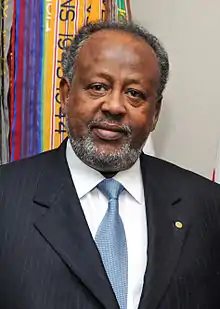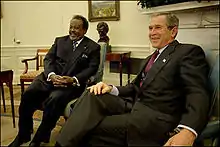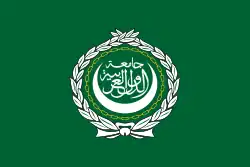Ismaïl Omar Guelleh
Ismaïl Omar Guelleh (Somali: Ismaaciil Cumar Geelle; Arabic: إسماعيل عمر جليه) (born 27 November 1947)[1][2] is the current president of Djibouti, in office since 1999. He is often referred to in the region by his initials, IOG.
Ismaïl Omar Guelleh إسماعيل عمر جليه | |
|---|---|
 | |
| 2nd President of Djibouti | |
| Assumed office 8 May 1999 | |
| Prime Minister | Barkat Gourad Hamadou Dileita Mohamed Dileita Abdoulkader Kamil Mohamed |
| Preceded by | Hassan Gouled Aptidon |
| Personal details | |
| Born | 27 November 1947 Dire Dawa, Ethiopia |
| Political party | People's Rally for Progress |
| Spouse(s) | Kadra Mahamoud Haid |
| Children | Haïbado Ismaïl Omar Fatouma-Awo Ismaïl Omar Abdinasir Omar Ismaïl Saalah |
Guelleh was first elected as President in 1999 as the handpicked successor to his uncle, Hassan Gouled Aptidon, who had ruled Djibouti since independence in 1977. Guelleh was re-elected in 2005, 2011 and again in 2016; the 2011 election was largely boycotted by the opposition amid complaints over widespread irregularities. Guelleh has been characterized as a dictator, and his rule has been criticized by some human rights groups.[3]
He was awarded with the Padma Vibhushan, India's second highest civilian award on 25 January 2019 for his role in the safe evacuation of Indian citizens from Yemen.[4]
Background
Guelleh was born in Dire Dawa, Ethiopia, into the politically powerful Mamassan subclan of the Dir Issa clan.[5] The father of Ismaïl Omar Guelleh, son of Guelleh Batal, is Omar Guelleh, one of the first native teachers in the 1930s before working, following his father's path, on behalf of the Franco-Ethiopian Railway Company (CFE) which built the line connecting Djibouti to Addis Ababa and whose head office was in Dire Dawa. When Guelleh was younger he attended a traditional Islamic school. In the 1960, Guelleh migrated to Djibouti before finishing high school. In 1964, at the age of 18, Ismail Omar Guelleh began working in the General Information of the French Territory of the Afars and the Issas, because he spoke Amharic, Somali, Arabic, French, Italian and English.[6]
In 1974, he was suspended from his duties because he was suspected of transmitting information to the independence movement. He then became involved in the African People's League for Independence (LPAI) chaired by Hassan Gouled Aptidon, who campaigns for independence. After Djibouti became independent, he became head of the secret police and chief of the cabinet in the government of his uncle Hassan Gouled Aptidon. He received training from the Somali National Security Service and then from the French Secret Service, and was intended to become his uncle's successor.
Presidency

On February 4, 1999, President Gouled Aptidon announced that he would retire at the time of the next election, and an extraordinary congress of his party, the ruling People's Rally for Progress (RPP), chose Guelleh as its presidential candidate.[7] As the joint candidate of the RPP and moderate wing of the Front for the Restoration of Unity and Democracy (FRUD), Guelleh won the presidential election held on April 9, 1999 with 74.02% of the vote, defeating his only challenger, the independent candidate Moussa Ahmed Idriss.[8][9] He took office on May 8.[10] Moussa Ahmed Idriss was arrested the following September for "threatening the morale of the armed forces" and detained at an undisclosed location.[11]
In December 2000, Guelleh sacked the chief of staff of the National Police Force, Yacin Yabeh; policemen loyal to Yacin unsuccessfully rebelled following his dismissal.[12]
Guelleh was nominated by the RPP as its presidential candidate for a second time on October 7, 2004, at an Extraordinary Congress of the party. He was backed by several other parties[13] and was the only candidate in the presidential election held on April 8, 2005.[14] Without a challenger, he won 100% of the ballots cast and was sworn in for a second six-year term, which he said would be his last, on May 7.[15]
However, in 2010, Guelleh persuaded the National Assembly of Djibouti to amend the nation's Constitution, allowing him to stand for a third term.[16][17] This cleared the way for him to place his name on the ballot in Djibouti's 2011 election. It also resulted in large protests beginning in 2010 similar to the larger movement for democracy in the Arab countries. The protests were quickly put down.
Opposition parties boycotted the election, leaving only one little-known candidate against him on the ballot. Guelleh won almost 80% of the vote.[18] Human Rights Watch questioned whether the election could be called fair when opposition leaders were jailed twice prior to polling.[19] He again said that he would not run for another term.[20]
Guelleh was also the winner of the 2016 election with about 87% of the popular vote.[21]
References
| Wikimedia Commons has media related to Ismail Omar Guelleh. |
- "(Page 7) Tout savoir sur Ismaïl Omar Guelleh – Jeune Afrique". JeuneAfrique.com (in French). Retrieved 2020-10-19.
- https://www.jeuneafrique.com/223692/archives-thematique/bio-express/
- "The world's enduring dictators". CBS News. May 16, 2011.
- Chaudhury, Dipanjan Roy. "Why awarding Padma Vibhushan to Djibouti President matters to India". The Economic Times. Retrieved 2021-01-07.
- "Country Reports on Human Rights Practices for 2007", report to Congress, U.S. Dept. of State, August 2008 (on Issa in Djibouti)
- "Djibouti: le président Ismaïl Omar Guelleh en 12 dates". RFI (in French). 2016-04-07. Retrieved 2020-10-19.
- "Djibouti: President Gouled Aptidon to retire in April after 22 years in power", AFP, February 4, 1999.
- "Proclamation du Président de la République de Djibouti par le Conseil Constitutionnel" Archived 2007-08-16 at the Wayback Machine, Journal Officiel de la République de Djibouti (in French).
- Elections in Djibouti, African Elections Database.
- "Sudan: President holds weekend talks with Ethiopia", IRIN, May 11, 1999.
- "Horn of Africa, Monthly Review, September - October 1999", UN-OCHA Archive (accessed 23 February 2009)
- "Witnesses describe 'coup attempt'", IRIN, December 8, 2000.
- "Le RPP plébiscite son candidat" Archived 2004-10-13 at the Wayback Machine, La Nation, October 11, 2004 (in French).
- "No challengers for Guelleh as presidential campaign kicks off", IRIN, March 29, 2005.
- "Guelleh sworn in for second presidential term", IRIN, May 9, 2005.
- "Djibouti lawmakers remove term limits", Reuters, April 11, 2010.
- "Djibouti politics: Issa job?", Economist Intelligence Unit Report, April 20, 2010.
- "Djibouti: President Ismael Omar Guelleh wins third term", BBC News, April 9, 2011.
- Djibouti: Allow Peaceful Protests", Human Rights Watch statement, April 4, 2011.
- "Djibouti president vows third term would be last", AFP, April 7, 2011.
- Djibouti President Ismail Omar Guelleh wins fourth term BBC News, 9 April 2016
| Political offices | ||
|---|---|---|
| Preceded by Hassan Gouled Aptidon |
President of Djibouti 1999–present |
Incumbent |
